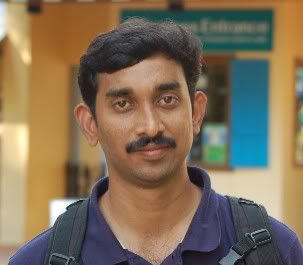Compress 60 GB into 2 GB via Matrix
CHENNAI, JUNE 8: A Chennai-based young scientist has claimed to have invented a superior ‘lossless’ compression technology for data transfer and management.
With simple repetition coding, the new technology, Adaptive Binary Optimisation (ABO), will achieve not only ‘lossless’ compression but also more compression.
"In this ABO technology, we maintain a binary index to store the original location of the data when we do the rearrangement and coding.
At the decompression stage, we can bring back the original data since we had already indexed the location," said 25-year-old Arvind Thiagarajan, who is an engineer in electronics and communication.
With ABO, for which patent applications are pending, large volume of data and big images can be captured and stored using lower processing power. It can transmit the data and images from one place to another using lower bandwidth connectivity, particularly without any "loss" of data.
When Thiagarajan first applied this compression technique on the images from a hospital in Singapore, he could achieve 35 times lossless compression. In traditional techniques like JPEG, MPEG, the compression was only four or five times and there were certain levels of loss of data.
Impressed with the technology, an American doctor coined a new expansion for ABO - A Better Option.
Thiagarajan said, "No one could believe it and even the scientific community was sceptical. We engaged Ernst & Young technology audit team to do the testing." "The compression rates may further be improved as we are working on this process," said Thiagarajan, who along with Ravi Govindan, an Indian businessman in Singapore, founded Matrixview Technologies (India) Pvt Ltd, to develop products for commercial applications.
Matrixview was registered in Australia as a foreign company in May 2004 and was listed on Australian stock exchange on August 5, 2004. Thigarajan said it would require 60 GB space to digitise the moving frame of echo data in hospitals. But with 30 times compression by ABO technology, it can be compressed to 2 GB of data.
"In India, using ABO technology, compressed images from rural clinics can be sent to, using less bandwidth, speciality hospitals in the city for expert opinion," said Govindan.
Echoview increased productivity by at least 40 per cent and saves significant costs and time for both doctors and patients, Sri Sathya Sai Institute of Higher Medical Sciences, which is using the equipment, said.
Matrixview's second product for document imaging has useful application in financial services, insurance, healthcare and government where huge pile of papers is to be scanned and stored. Documat can store this in a centralised depositary in a highly compressed manner to save a lot of storage costs," Thiagarajan said. The company has filed 13 patents and it will be filing few more in the near future.
http://www.financialexpress.com/latest_full_story.php?content_id=93220 Read more!
With simple repetition coding, the new technology, Adaptive Binary Optimisation (ABO), will achieve not only ‘lossless’ compression but also more compression.
"In this ABO technology, we maintain a binary index to store the original location of the data when we do the rearrangement and coding.
At the decompression stage, we can bring back the original data since we had already indexed the location," said 25-year-old Arvind Thiagarajan, who is an engineer in electronics and communication.
With ABO, for which patent applications are pending, large volume of data and big images can be captured and stored using lower processing power. It can transmit the data and images from one place to another using lower bandwidth connectivity, particularly without any "loss" of data.
When Thiagarajan first applied this compression technique on the images from a hospital in Singapore, he could achieve 35 times lossless compression. In traditional techniques like JPEG, MPEG, the compression was only four or five times and there were certain levels of loss of data.
Impressed with the technology, an American doctor coined a new expansion for ABO - A Better Option.
Thiagarajan said, "No one could believe it and even the scientific community was sceptical. We engaged Ernst & Young technology audit team to do the testing." "The compression rates may further be improved as we are working on this process," said Thiagarajan, who along with Ravi Govindan, an Indian businessman in Singapore, founded Matrixview Technologies (India) Pvt Ltd, to develop products for commercial applications.
Matrixview was registered in Australia as a foreign company in May 2004 and was listed on Australian stock exchange on August 5, 2004. Thigarajan said it would require 60 GB space to digitise the moving frame of echo data in hospitals. But with 30 times compression by ABO technology, it can be compressed to 2 GB of data.
"In India, using ABO technology, compressed images from rural clinics can be sent to, using less bandwidth, speciality hospitals in the city for expert opinion," said Govindan.
Echoview increased productivity by at least 40 per cent and saves significant costs and time for both doctors and patients, Sri Sathya Sai Institute of Higher Medical Sciences, which is using the equipment, said.
Matrixview's second product for document imaging has useful application in financial services, insurance, healthcare and government where huge pile of papers is to be scanned and stored. Documat can store this in a centralised depositary in a highly compressed manner to save a lot of storage costs," Thiagarajan said. The company has filed 13 patents and it will be filing few more in the near future.
http://www.financialexpress.com/latest_full_story.php?content_id=93220 Read more!

